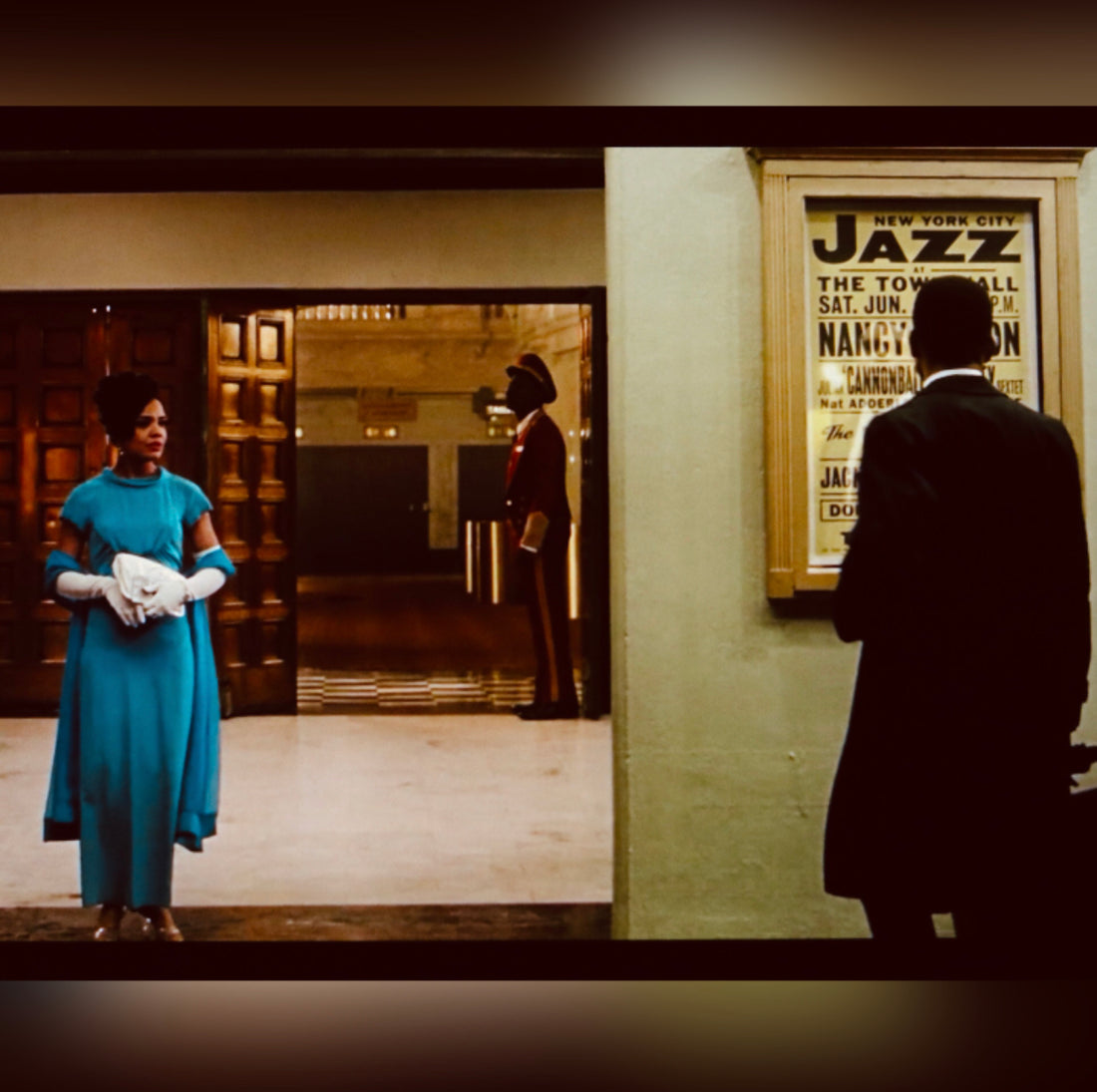Sylvie's Love - Analyzed
.
Central to representing values and beliefs, customs and practices in modern culture. As we watch films, we cannot help but ask how diverse groups can express themselves or respond to representation.
The Film explores a journey of Love staged in the early 60s between a young woman, Sylvie, who’s set to marry a wealthy doctor, and a young, talented saxophonist, Robert, in New York City.


We will explore what role stereotypes, hierarchy, power, and desire play in the circulation of the image of black Love that this Film frames by linking specific social and historical contexts in which they arise juxtaposed with a few formal qualities of cinematic aesthetic such as editing, lighting, camera, and sound.
.
Why is film studies important?
1. It’s an art; aesthetic features are paramount. (wardrobe, music, frame composition)
2. Viewers enter into a mystical realm of appreciation, divorced from social and historical specificity.

love is not selfish as a reoccurring theme - Song relation (Mango by Kamauu ft Adeline)
It's important to point out the lack of black bodies in films around this period, especially black love on screen, so to see a relationship that flourishes based on multiple sacrifices is beautiful.
Mango (lyrics) - Kamauu
If you found some other dude
What do I do
If he loves you truly
How could I not love him too
If he improves you
More than I used to
I don't want nothing but you
Getting what you need
Even if it ain't from me
Cuz I love you
And what love is
Never selfish
And of service
Cuz I love you
And what love is
Never selfish

On the other hand
The tone of the film romanticizes cheating and lying. So, I pose this question.
"at what point should we allow our self-imposed Superego to control romantic decisions?"
Super ego: the part of a person's mind that acts as a self-critical conscience, reflecting social standards learned from parents and teachers. The process sociologists term as social learning
IMO, the lack in honest communication was probably the main reason why a lot of things happen they way they did, obviously for narrative purposes the story needed that to progress but when we relate it to our own lives and behaviours it’s important to think critically.
.
We see this in the way they explore black love, not only do we see cheating, lying, unrequited love we see the sacrifice of what loving someone so deeply could look like. For example when Sylvie stops herself from telling Robert she’s pregnant so he can Pursue his music career and her ex husband who even after he finds out the child was not his marries her.
.
But we also see how it should be better than that because they're not fully communicating their issues, situations, and problems, which created prolonged resentment and more problems.
.
The biggest issue was Robert, when he professed his desire to provide for his daughter and Sylvie, then a few financial bumps down the road, suddenly declared himself "not a family man," his words exactly. Because of Ego and pride, he would rather not even be around (that shit is TOXIC)
.
Part 2

.
Ideologies
How a certain image of one's place in the world becomes internalized (self-identify) and then functions as a guide to proper conduct in a given social context. ( the way we behave and interact)
.
Love for black people historically has constantly been ripped apart and heavily judged by colonizers and patriarchal institutional systems of oppression and has been considered less valued; we see this in real life through mass incarceration, racial blanketing, and gaslighting.
.
The black family united under the systems of the social institution has been seen as a threat to white patriarchy. Because of that, the way most people identify with love is mostly associated with pain, heartbreak, and self-doubt.
.
A perfect example of racial blanketing in the movie, would be when Sylvie’s ex husband expected her to assume her role as the housewife to impress his white boss with a home cooked meal so he could secure the big financial raise.
.
We soon find out the only reason why he's being considered is because his company is receiving backlash for racist hiring practices. So, he becomes the blanket to hide the bigotry within the company. Sylvie sees that and voices her concerns and is brushed off, the same way he brushed her off when she told him she started a new position as a production assistant.
.
His exact answer to hearing about her new job was "OOK??"
And then proceeds to say: "I thought we agreed you can work as long as it doesn't interfere with your responsibilities at home. Be a dear and pull something together".
.
The camera then pans into a medium close up shot of her face and you see how she fights the tears back but shows just enough tears pilling up, that you know his words pierced, I know i felt it.
.
Here I think for her is when the resentment for him starts to grow and fester. The clash in ideologies between the two showcases the onset of the demise of their relationship.
.
This movie also embodies the essence of the chorus of ‘its not right but its’ ok by Whitney Huston
(cc: Robert)
It's not right
But it's okay
I'm gonna make it anyway
Pack your bags up and leave
Don't you dare come running back to me
(cc: ex husband)
It's not right
But it's okay
I'm gonna make it anyway
Close the door behind you, leave your key
I'd rather be alone than unhappy
.
Theme - heavy on resentment
The system of policing towards black women emotional behaviour is outright problematic. We see the in the film when Sylvie's EX husbands tells her it's not normal to be working on the day of her father funeral, although it was strange, it's no ones right to tell someone else how to grieve loss.
.
Part 3
As the group of people are moved back into the audience, the song flawless begins the part: Chimamanda Ngozi Adichie
We teach girls to shrink themselves
To make themselves smaller
We say to girls
"You can have ambition
But not too much
You should aim to be successful
But not too successful
Otherwise you will threaten the man"
Because I am female
I am expected to aspire to marriage
I am expected to make my life choices
Always keeping in mind that
Marriage is the most important
Now marriage can be a source of
Joy and love and mutual support
But why do we teach girls to aspire to marriage
And we don't teach boys the same?
We raise girls to see each other as competitors
Not for jobs or for accomplishments
Which I think can be a good thing
But for the attention of men
We teach girls that they cannot be sexual beings
In the way that boys are
Feminist: the person who believes in the social
Political, and economic equality of the sexes
.

.
This film embodies an ever growing list of movies that are an amazing example of the term ‘paradigm shift’ meaning
The basic assumptions are questioned and an entirely new way of seeing things arise.
.
Gender Roles
The role of women in American society changed dramatically in the 1960s. At the beginning of the decade, women were portrayed on television and in advertisements as happy homemakers, secretaries, teachers, and nurses.
.

.
Women who did not get married were depicted as unattractive, unfortunate spinsters, and those who asserted themselves were dismissed as nagging shrews. Women were to strive for beauty, elegance, marriage, children, and a well-run home. Meanwhile, popular culture ignored the fact that all women did not fit the mold that tradition had proscribed for them.
.
In the film Sylvie’s mother was very much ingrained with an expectation of the female image from her era (we call this generational differences) this is a space where beliefs, norms, and biases clash with the changing societal behaviours and views of the new generation.
.

.
There was definitely a pull and tug of that concept represented in the narration of the film. We see her mother in the beginning of the film, trying to create the product of her female image through Sylvie and the younger generation.
.


.
However, the film is so good at representing this concept as a truth but not focussing on it as the only acceptable truth. We didn’t see her mothers reaction to the pregnancy, or the mess of what the beginning stages of her marriage with Lacey was, but we do see is the triumph of her career as Sylvie goes along to become another black producer that made the big decisions.
.


.
I will refer back to a point I made earlier about film studies
- Viewers enter into a mystical realm of appreciation, divorced from social and historical specificity
We know at the time this was not how the tv/film industry at large is occupied. But the film choosing to showcase that, is the beauty and magic of film. I most definitely appreciated that representation.
.



